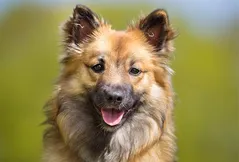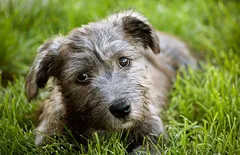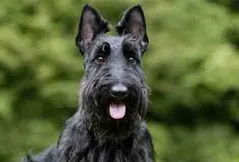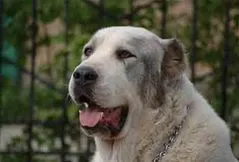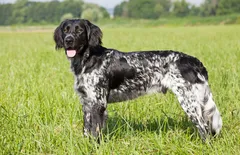
Small Munsterlander Pointer
The Small Münsterländer is a very attractive breed with a medium-length, glossy coat.
Overall Status
| Height | 20.5 to 21 inches |
| Temperament | Intelligent, Devoted, Self-Confident |
| Weight | 40 to 60 pounds |
| Life Expectancy | 12 to 14 years |
| Coat Color | Brown, Brown & White, Brown & Roan |
| Barking Level | Medium |
Quick Factors
| Playfulness | |
| Dog Friendly | |
| Exercise Need | |
| Grooming Needs | |
| Strangers Friendly | |
| Family Affectionate |
Daily Care
Grooming Tips
Occasional brushings will maintain the quality of the coat with the occasional bath to keep them clean and looking their best. Small Munsterlanders are seasonal shedders and as such it is important to maintain their coats more frequently in the late spring and early fall. Their nails should be trimmed regularly with a nail clipper or grinder to avoid overgrowth, splitting, and cracking.The rest is basic care. Trim the nails as needed, usually every week or two. Keep the ears clean and dry, and brush the teeth frequently with a vet-approved pet toothpaste for good overall health and fresh breath.
Exercise Tips
While Small Munsterlanders make wonderful family companions, they do require frequent exercise and stimulation. The breed was born to hunt and that is the task they are happiest at. This is an all-purpose, versatile hunting breed that was developed to hunt, point, retrieve, and track game.The breed’s hunting heritage means they have a high activity level and need appropriate outlets for their energy, including dailyexercise. This breed needs at least an hour of vigorous exercise each day and will also appreciate having a fenced yard in which to run and play. Training your Small Münsterländer for dog sports or hunting can provide additional exercise as well.
Feeding Tips
As a medium- to large-sized dog, the Small Münsterländer should be fed a high-quality dry food formulated for adult dogs. You should also remember that, because this breed was developed for hunting, he may do well on an active or working breed formula. Talk to your vet about your dog’s nutritional needs based on his size and activity level.If you get a Small Münsterländer puppy from a breeder, they would give you a feeding schedule and it's important to stick to the same routine, feeding the same puppy food to avoid any tummy upsets. You can change a puppy's diet, but this needs to be done very gradually always making sure they don't develop any digestive upsets and if they do, it's best to put them back on their original diet and to discuss things with the vet before attempting to change it again.Older dogs are not known to be fussy or finicky eaters, but this does not mean you can feed them a lower quality diet. It's best to feed a mature dog twice a day, once in the morning and then again in the evening, making sure it's good quality food that meets all their nutritional requirements. It's also important that dogs be given the right amount of exercise so they burn off any excess calories or they might gain too much weight which can lead to all sorts of health issues. Obesity can shorten a dog's life by several years so it's important to keep an eye on their waistline from the word go.Treatscan be an important aid in training, but giving too many can cause obesity. Learn about whichhuman foodsare safe for dogs, and which are not. Check with your vet if you have any concerns about your dog’s weight or diet.Clean, fresh water should be available at all times.
Health Tips
Conscientious Small Munsterlander breeders in both the United States and Europe have made a concerted effort to maintain the health of the breed.The Small Münsterländer is a very healthy breed overall with congenital problems being very rare. All dogs are, however, prone to certain health problems and some that may affect this breed include ear infections, skin problems, and hip dysplasia.
Trainability
The Small Münsterländer is a highly intelligent and very trainable breed that excels in a variety of roles as a hunter. These dogs learn very quickly with consistent training, but you should handle them gently and use only positive reinforcement training methods. If you try to force the Small Münsterländer to do something he doesn’t want to do, he can be stubborn and willful. Generally speaking, however, this breed is eager to please, obedient, and wonderful to work with.It is important to find a way to fit your Small Munsterlander into your pastimes. This will give him the chance to spend time with you and work for you, leading to a joyful and well-adjusted companion.
History
The Small Munsterlander originated in Germany. It is descended from the long coated German Spaniels and is a spaniel type dog that points game. In 1921, a standard was drawn up in Germany by Mr. Friedrich Jungklaus, and it has been followed since that time, though the true origins of the breed are not clearly known.Like so many breeds, the Small Munsterlander nearly disappeared during World War II because of food shortages, but the breed was revived in its homeland. From there, the dogs spread to other countries, where they were prized for their small size, hunting abilities, and family-friendly nature. In the United States, theSmall Munsterlander Club of North Americais helping guide the breed’s development here. The United Kennel Club recognized the breed in 2006.

